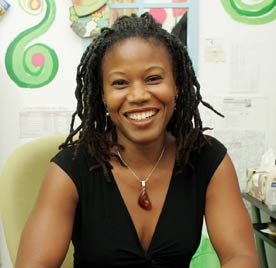The Logan Square Neighborhood Association (LSNA) is a grass-roots community organization serving the multi-ethnic communities of Logan Square and the Lathrop Homes, a public-housing development. LSNA organized neighbors, veteran Cooper workers, and the LEED Council to form the Cooper Lamps Task Force. As Cooper began to lay off 125 workers during the summer of 2005, the task force obtained enhanced job-training from the city and severance benefits from the owners, as they organized a community campaign to preserve the factory as a site for jobs. With the support of Alderman Manny Flores (1st Ward) for a jobs-focused use for the plant, the big condo developer backed off and sold the plant to Baum Realty, a commercial developer.
Today, Baum is renovating the shuttered factory into the Green Exchange, a sustainable business community designed for the advancement of the green marketplace. With a mix of green businesses under one very green roof, this four-story 272,000-square-foot space will foster synergies and provide a variety of opportunities for its tenants to grow green exponentially. The developers plan to deliver space to tenants in late 2008 and are currently negotiating with green businesses seeking a retail presence, showroom galleries, office or working/living space. The mission of the Green Exchange is to “move the green marketplace from niche to mainstream while furthering the green economy and serving people, planet and profit,” according to David Baum.
Meanwhile, as construction continues, LSNA and LEED Council are identifying residents who have the skills for the spectrum of jobs to be offered by the incoming tenants. “If it weren’t for neighborhood leaders, this building would have been condos,” notes LSNA organizer John McDermott. “We want to make sure that neighborhood families who are low and moderate income get to participate in and benefit from this innovative project.”
Chicagoland Green Collar Jobs Initiative
Leveraging the opportunity that one building offers for a more far-reaching impact requires partnering on a broader scale. With the leadership of Mayor Richard M. Daley, the City of Chicago has become a national model for promoting green practices and development. Building on existing relationships and forging new ones, LEED Council reached out to build a coalition for green jobs all over Chicago.
Since the fall of 2007, Chicago groups that support a green agenda have been collaborating — first informally and now deliberately — to pursue the promise of green jobs. The first joint project was to convene a December 2007 summit to explore both local and national efforts promoting green-collar jobs. Representatives from Green for All and its national partners, the Apollo Alliance and the Workforce Alliance, were speakers at the summit, which attracted more than 150 attendees from a wide variety of professional and community backgrounds.
A steering committee now guides the Chicagoland Green Collar Jobs Initiative. Members include BIG: Blacks in Green; Chicago Federation of Labor Workers Assistance Committee; Chicago Sustainable Business Alliance; City of Chicago Department of Environment; Delta Institute; LEED Council; Midwest Energy Efficiency Alliance; U.S. Green Building Council Chicago Chapter; and Wilbur Wright College, one of the City Colleges of Chicago. Quarterly meetings with other interested organizations are fostering ongoing dialogue on both policy and programs.
The diversity of these agencies and the growing number of 2008 partners demonstrate the breadth of stakeholders that can be assembled to collaborate and are necessary to develop a skilled workforce that is ready to meet employer demands in the new “green” market. The initiative will engage Chicago-area employers, job-seekers, training providers, and public agencies in the development of workforce programs for emerging green jobs and to capture these new employment opportunities for Chicagoland’s low-skilled individuals.
Emerging green-collar jobs in the Chicago region can be categorized in several sectors:
- Energy efficiency for homes and commercial buildings
- Building construction and operations, such as green cleaning
- Alternative energy service providers (solar, wind, geothermal)
- Installation and maintenance of storm water management systems (green roof, permeable pavement, rain-water collection)
- Urban horticulture and agriculture (landscaping and farming)
- Green-related products and services (recycling and supplies)




Comments